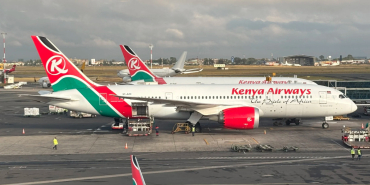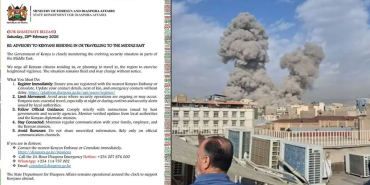Tears and Smoke: A Kenyan Woman's Desperate Plea from Beirut

The escalating conflict in southern Lebanon has reached the capital city of Beirut, where Noreen Wacu, a Kenyan domestic worker, witnessed an explosion from her twelfth-floor apartment in the Nasra district.
The incident confirmed her worst fears about the spreading violence, as thick grey smoke billowed into the sky just blocks from her residence. Wacu, who emigrated from Thika, Kenya, five months ago in pursuit of better economic opportunities, now finds herself caught in an increasingly dangerous situation. As Israeli airstrikes targeting suspected Hezbollah strongholds intensify throughout Beirut, civilian casualties continue to mount, affecting both local residents and foreign workers. Through tears, Wacu expresses her desperate desire to leave, citing concerns for her three children's welfare should she become another casualty of the conflict.
According to Diaspora Affairs Principal Secretary Roseline Njogu, the Kenyan government has initiated evacuation efforts successfully relocating 257 citizens from Lebanon, with plans to evacuate an additional 300 in the coming weeks. However, these efforts have faced criticism for their perceived lack of urgency. Mombasa Woman Representative Zamzam Mohammed has voiced particular concern about the pace of evacuations, lamenting the critical nature of the situation for Kenyan citizens trapped in the conflict zone. The crisis has exposed the vulnerable position of Kenyan domestic workers in Lebanon, many of whom are young women between 19 and 36 years old.
Economic hardship drove them to seek employment in Lebanon despite their educational qualifications, including diplomas and professional certificates. While some employers maintain ethical practices, others have been accused of exploitation, including withholding passports and wages, and denying basic rights. The Kenyan government has allocated Sh100 million for evacuation efforts, yet some workers report difficulties accessing assistance from their embassy. The situation has taken a psychological toll on workers, as evidenced by discussions in support groups such as "Unstoppable Ladies in the Gulf."
The impact extends to families in Kenya, including those like Mzee Justus Mogire from Kisii County, who hasn't heard from his daughter Clare in two years. Working conditions have deteriorated significantly since Israel expanded its military operations into Lebanon. Workers like Eulita Cherop from Kapsabet, managed to leave Lebanon in October and now advocate for others' evacuation through social media platforms. The situation is particularly challenging for workers like Maryanne Moraa in Saida, who faces contract extensions without consent while living under constant threat of violence.
Some workers, desperate to leave, have been forced onto the streets after employers refused to release them—a phenomenon known locally as "Kembois." The rigid contract system has created additional barriers for those seeking to depart the country. The humanitarian toll of the conflict continues to mount, with reports indicating at least 3,300 fatalities and over 14,000 injuries resulting from Israeli attacks on Lebanon since the outbreak of hostilities. While some Kenyan nationals have found refuge in Beirut's shelters, others remain hesitant to register for evacuation.














Add new comment